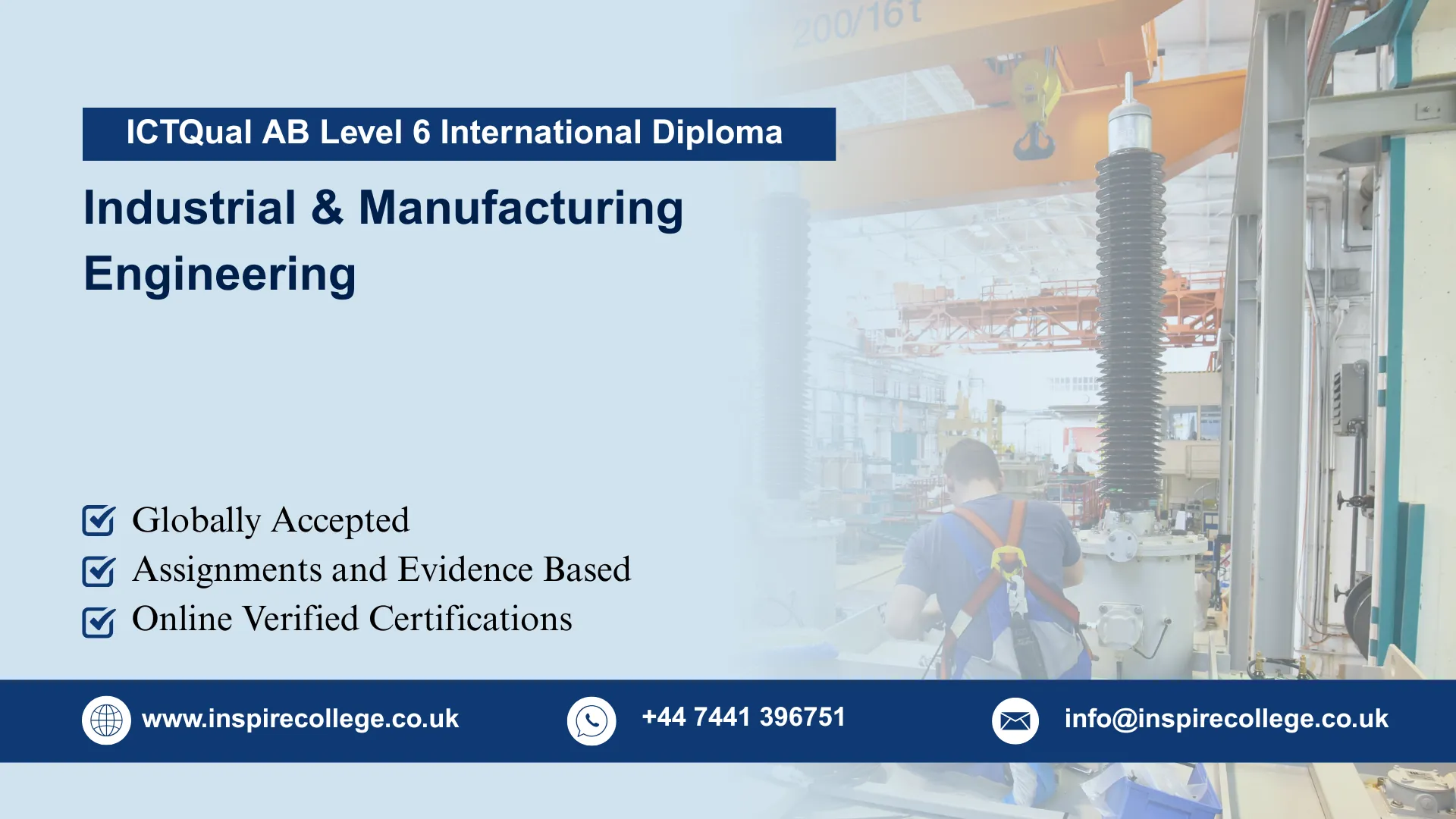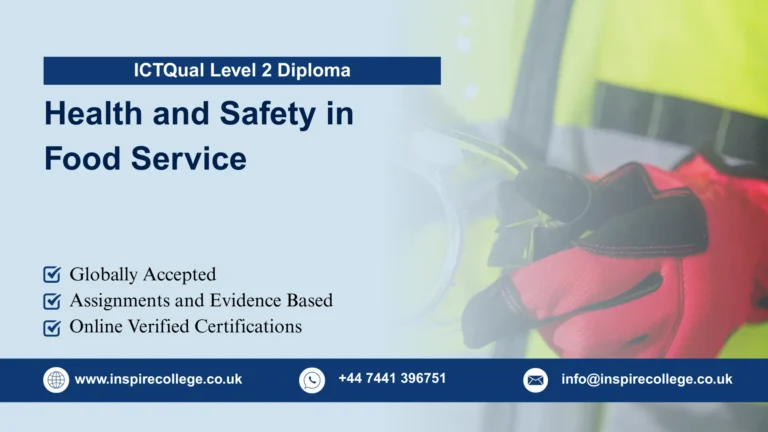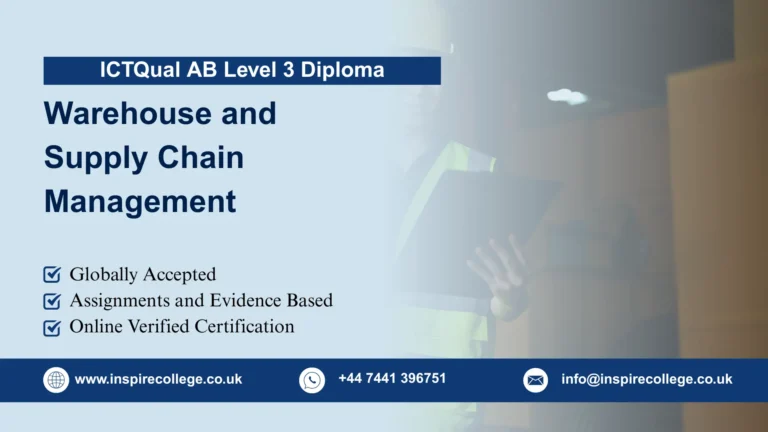
ICTQual AB Level 6 International Diploma in Industrial & Manufacturing Engineering
The ICTQual AB Level 6 International Diploma in Industrial & Manufacturing Engineering is designed to equip learners with advanced technical knowledge and practical expertise in modern industrial processes, manufacturing systems, and engineering management. In today’s competitive and technology-driven industrial landscape, professionals with a strong foundation in manufacturing engineering, process optimisation, and quality management are in high demand.
ICTQual AB Level 6 International Diploma in Industrial & Manufacturing Engineering provides a comprehensive understanding of both theoretical and applied aspects of industrial and manufacturing engineering. Learners will explore key areas such as production planning, automation, lean manufacturing, supply chain integration, materials science, and industrial safety. Through practical projects, simulations, and research-led learning, students gain hands-on experience in solving real-world engineering challenges, improving operational efficiency, and implementing innovative manufacturing solutions.
The ICTQual AB Level 6 International Diploma in Industrial & Manufacturing Engineering is suitable for both fresh graduates and experienced professionals aiming to advance their careers in industrial sectors. Graduates will develop skills in process optimisation, industrial system design, quality assurance, project management, and technology-driven production methods. The curriculum also fosters critical thinking, analytical problem-solving, and leadership abilities, preparing learners to take on supervisory and management roles within manufacturing organisations, production facilities, and engineering consultancies.
By completing the ICTQual AB Level 6 International Diploma in Industrial & Manufacturing Engineering, learners achieve an internationally recognised qualification that opens opportunities for career growth, technical specialisation, and further postgraduate studies in industrial engineering, manufacturing management, and related disciplines. This programme bridges academic knowledge with industry-relevant skills, empowering learners to contribute effectively to global manufacturing and industrial sectors.
The ICTQual AB Level 6 International Diploma in Industrial & Manufacturing Engineering welcomes learners from diverse academic and professional backgrounds. To ensure learners are well-prepared for the rigour of this three-year, 360-credit programme, the following entry requirements apply:
Age Requirements
- Applicants must be at least 18 years old at the time of enrolment.
Educational Requirements
- A high school diploma, A-levels, or equivalent is required for fresh learners.
- Completion of relevant Level 4 or Level 5 engineering or technical qualifications is an advantage.
- Related courses: ICTQual AB Level 5 International Diploma in Mechanical Engineering or Industrial Engineering Foundation Courses.
Professional Experience
- For experienced professionals, a minimum of 6 years verifiable experience in industrial, manufacturing, or engineering roles is preferred.
- Demonstrated practical expertise can support eligibility for fast-track certification routes.
English Language Proficiency
- Applicants whose first language is not English must provide evidence of proficiency.
- Acceptable qualifications include IELTS 5.5+, TOEFL, or equivalent recognised English tests.
This structured entry requirement framework ensures learners possess the foundational knowledge and skills to successfully complete the diploma and maximise practical learning outcomes.
Mandatory Units
This qualification, the ICTQual AB Level 6 International Diploma in Industrial & Manufacturing Engineering 360 Credits – Three Years, consists of 36 mandatory units.
Year 1 – Foundation in Industrial & Manufacturing Engineering
- Principles of Industrial and Manufacturing Engineering
- Engineering Mathematics
- Fundamentals of Mechanical and Electrical Engineering
- Materials Science and Engineering
- Engineering Drawing and CAD
- Introduction to Manufacturing Processes
- Basics of Automation and Control Systems
- Production Planning and Operations Management
- Quality Fundamentals and Inspection Techniques
- Health, Safety, and Environmental Practices in Engineering
- Communication and Technical Report Writing
- Introduction to Project Management in Engineering
Year 2 – Intermediate Studies in Industrial & Manufacturing Engineering
- Manufacturing Systems and Technology
- Advanced Production Planning and Scheduling
- Lean Manufacturing and Continuous Improvement
- Industrial Automation and PLC Programming
- Supply Chain and Logistics Management
- Mechanical Design and Manufacturing Processes
- Industrial Maintenance and Reliability Engineering
- Computer-Aided Manufacturing (CAM)
- Data Acquisition and Process Monitoring
- Sustainable Manufacturing and Green Engineering
- Applied Research Methods in Engineering
- Human Factors and Ergonomics in Manufacturing
Year 3 – Advanced Studies in Industrial & Manufacturing Engineering
- Smart Manufacturing and Industry 4.0
- Advanced Manufacturing Technologies (Additive, CNC, etc.)
- Robotics and Autonomous Systems in Manufacturing
- Advanced Quality Management and Six Sigma
- Cyber-Physical Systems and IoT in Manufacturing
- Supply Chain Optimisation and Global Operations
- Advanced Process Engineering and Simulation
- Innovation and Product Development in Engineering
- Professional Ethics and Sustainability in Manufacturing
- Technology Entrepreneurship and Business Development
- Infrastructure and Facility Planning for Manufacturing Systems
- Final Year Major Project (Capstone Project)
The ICTQual AB Level 6 International Diploma in Industrial & Manufacturing Engineering equips learners with comprehensive technical knowledge, practical skills, and managerial expertise essential for high-performance roles in modern manufacturing and industrial sectors. Upon completion, learners gain measurable competencies in production, automation, quality assurance, and leadership in engineering projects.
Year 1 – Foundation in Industrial & Manufacturing Engineering
Principles of Industrial and Manufacturing Engineering
- Understand the core principles, concepts, and applications of industrial and manufacturing engineering.
- Develop analytical skills for assessing production efficiency and process optimisation.
- Apply fundamental engineering techniques to solve real-world manufacturing challenges.
Engineering Mathematics
- Apply mathematical methods to engineering problems, including algebra, calculus, and statistics.
- Model and analyse industrial systems using quantitative techniques.
- Develop problem-solving skills for engineering design and production processes.
Fundamentals of Mechanical and Electrical Engineering
- Gain knowledge of mechanical systems, electrical circuits, and their integration in manufacturing.
- Perform basic engineering calculations and design assessments.
- Apply theoretical knowledge to practical industrial scenarios.
Materials Science and Engineering
- Understand properties, selection, and applications of engineering materials.
- Assess material suitability for different manufacturing processes.
- Apply material testing and analysis techniques in engineering projects.
Engineering Drawing and CAD
- Create technical drawings using manual and computer-aided methods.
- Interpret engineering schematics for design and manufacturing purposes.
- Use CAD tools to produce accurate models and visualisations of components.
Introduction to Manufacturing Processes
- Identify and describe core manufacturing methods, including casting, machining, and forming.
- Evaluate process efficiency, quality, and cost implications.
- Apply knowledge to improve production workflows.
Basics of Automation and Control Systems
- Understand fundamental concepts of industrial automation and control systems.
- Analyse the role of sensors, actuators, and controllers in manufacturing.
- Implement basic automation solutions to enhance production efficiency.
Production Planning and Operations Management
- Understand production scheduling, capacity planning, and workflow optimisation.
- Apply operations management techniques to enhance efficiency and reduce waste.
- Evaluate performance metrics for manufacturing systems.
Quality Fundamentals and Inspection Techniques
- Learn core principles of quality assurance and control.
- Apply inspection methods to evaluate product conformity and standards.
- Develop strategies to maintain consistent product quality.
Health, Safety, and Environmental Practices in Engineering
- Understand occupational health and safety regulations in industrial settings.
- Apply safe working practices and risk assessment techniques.
- Integrate sustainable practices into manufacturing processes.
Communication and Technical Report Writing
- Develop professional written and oral communication skills.
- Produce technical reports and documentation for engineering projects.
- Present technical findings clearly to varied audiences.
Introduction to Project Management in Engineering
- Understand the principles of project planning, execution, and control.
- Apply project management tools to manage engineering tasks effectively.
- Evaluate project performance against goals, timelines, and resources.
Year 2 – Intermediate Studies in Industrial & Manufacturing Engineering
Manufacturing Systems and Technology
- Analyse modern manufacturing systems and technological advancements.
- Integrate automation, robotics, and digital tools into production systems.
- Evaluate manufacturing efficiency and system performance.
Advanced Production Planning and Scheduling
- Apply advanced techniques for production scheduling and workflow management.
- Optimise resource allocation and reduce lead times.
- Analyse production data for continuous improvement.
Lean Manufacturing and Continuous Improvement
- Implement lean principles to eliminate waste and enhance efficiency.
- Use Kaizen and continuous improvement techniques in manufacturing operations.
- Measure process improvements using key performance indicators.
Industrial Automation and PLC Programming
- Develop programming skills for industrial PLC systems.
- Integrate automated solutions into manufacturing processes.
- Troubleshoot and optimise control systems for efficiency and reliability.
Supply Chain and Logistics Management
- Understand supply chain networks and logistics operations.
- Apply strategies for inventory management, procurement, and distribution.
- Evaluate global supply chain performance metrics.
Mechanical Design and Manufacturing Processes
- Design mechanical components for manufacturability and efficiency.
- Analyse production processes and optimise material usage.
- Apply engineering principles in real-world manufacturing projects.
Industrial Maintenance and Reliability Engineering
- Develop skills in preventive and predictive maintenance strategies.
- Analyse system reliability and failure modes.
- Implement maintenance programs to reduce downtime and costs.
Computer-Aided Manufacturing (CAM)
- Use CAM software for programming and controlling CNC machines.
- Integrate CAD designs into automated manufacturing processes.
- Evaluate manufacturing outcomes for accuracy and efficiency.
Data Acquisition and Process Monitoring
- Implement sensors and data acquisition systems in manufacturing environments.
- Monitor process parameters to ensure optimal performance.
- Analyse data to identify trends, errors, and improvement areas.
Sustainable Manufacturing and Green Engineering
- Apply principles of sustainability in manufacturing processes.
- Evaluate environmental impacts of industrial operations.
- Implement energy-efficient and eco-friendly production strategies.
Applied Research Methods in Engineering
- Conduct engineering research using systematic methodologies.
- Analyse and interpret research data to support decision-making.
- Develop evidence-based solutions for manufacturing challenges.
Human Factors and Ergonomics in Manufacturing
- Understand human-machine interactions in industrial settings.
- Apply ergonomic principles to improve workplace safety and efficiency.
- Design workstations and processes that reduce fatigue and errors.
Year 3 – Advanced Studies in Industrial & Manufacturing Engineering
Smart Manufacturing and Industry 4.0
- Integrate IoT, cyber-physical systems, and smart technologies into manufacturing.
- Evaluate the impact of Industry 4.0 on productivity and competitiveness.
- Apply digital tools for real-time monitoring and optimisation of operations.
Advanced Manufacturing Technologies (Additive, CNC, etc.)
- Gain expertise in additive manufacturing, CNC machining, and advanced fabrication methods.
- Evaluate technology selection for different production applications.
- Apply practical skills to implement modern manufacturing techniques.
Robotics and Autonomous Systems in Manufacturing
- Understand the design and operation of industrial robots and autonomous systems.
- Integrate robotic solutions into production lines.
- Optimise robot-assisted processes for efficiency and accuracy.
Advanced Quality Management and Six Sigma
- Apply Six Sigma and advanced quality management methodologies.
- Analyse manufacturing processes to reduce defects and variability.
- Implement continuous improvement programs for sustained quality performance.
Cyber-Physical Systems and IoT in Manufacturing
- Develop skills in integrating physical systems with digital technologies.
- Monitor production and perform predictive maintenance using IoT tools.
- Analyse system performance for intelligent decision-making.
Supply Chain Optimisation and Global Operations
- Optimise supply chains for efficiency, cost-effectiveness, and global competitiveness.
- Apply advanced logistics and operations management principles.
- Analyse global market trends for strategic decision-making.
Advanced Process Engineering and Simulation
- Model, simulate, and optimise manufacturing processes.
- Evaluate process performance for efficiency and sustainability.
- Apply simulation tools for risk reduction and production planning.
Innovation and Product Development in Engineering
- Design and develop innovative products aligned with market needs.
- Implement product development methodologies and prototyping.
- Evaluate product feasibility, cost, and sustainability.
Professional Ethics and Sustainability in Manufacturing
- Apply ethical principles and sustainability standards in industrial projects.
- Evaluate the social and environmental impact of engineering decisions.
- Develop responsible and accountable manufacturing practices.
Technology Entrepreneurship and Business Development
- Understand entrepreneurship in industrial and manufacturing contexts.
- Develop business plans and commercialisation strategies for innovations.
- Analyse market opportunities for new products or manufacturing solutions.
Infrastructure and Facility Planning for Manufacturing Systems
- Design and plan efficient manufacturing facilities and workflows.
- Evaluate plant layout, equipment placement, and logistics integration.
- Apply safety, efficiency, and sustainability considerations in facility design.
Final Year Major Project (Capstone Project)
- Plan and execute a comprehensive industrial engineering project.
- Integrate knowledge from all units to solve a real-world manufacturing challenge.
- Demonstrate problem-solving, research, and professional competencies at Level 6 standards.
By completing this three-year, 360-credit programme, learners develop measurable expertise in industrial and manufacturing engineering, combining technical knowledge, practical skills, and managerial capabilities to excel in global industries and advanced engineering roles.
The ICTQual AB Level 6 International Diploma in Industrial & Manufacturing Engineering is designed for motivated learners seeking to develop advanced technical, managerial, and practical skills required in modern manufacturing and industrial sectors. This programme is suitable for a wide range of learners with diverse educational and professional backgrounds.
Fresh School Leavers
- Recent secondary school or high school graduates aiming to start a career in industrial engineering, manufacturing, or production management.
- Provides a strong academic foundation in engineering principles, manufacturing processes, and technical problem-solving.
- Prepares learners for entry-level roles in production, operations, and industrial technology.
Aspiring Industrial Professionals
- Individuals seeking to enter the industrial or manufacturing sector with a focus on technical and managerial expertise.
- Develops practical skills in automation, process optimisation, quality control, and manufacturing management.
- Offers a pathway to career growth in factories, production plants, and industrial operations.
Current Engineering or Technical Practitioners
- Technicians, mechanical engineers, or production supervisors looking to specialise in advanced manufacturing and industrial engineering.
- Supports career advancement into supervisory, managerial, or specialist engineering roles.
- Enhances practical competencies and professional recognition in international industrial standards.
International Learners
- Students from around the world seeking an internationally recognised diploma in industrial and manufacturing engineering.
- Builds cross-cultural knowledge and adaptability for working in diverse global manufacturing environments.
- Provides qualifications aligned with international engineering and industrial standards.
Career Changers
- Professionals from non-engineering or unrelated fields who are passionate about industrial innovation and manufacturing processes.
- Offers a structured pathway into a high-demand sector with global career opportunities.
- Develops technical, analytical, and managerial skills necessary to transition successfully into industrial engineering roles.
This programme ensures that learners gain specialised knowledge, practical experience, and professional recognition, equipping them to thrive in advanced industrial and manufacturing roles worldwide.
As an approved ICTQual AB centre, we provide learners with the opportunity to enrol in the ICTQual AB Level 6 International Diploma in Industrial & Manufacturing Engineering through structured certification routes designed for both experienced professionals and fresh learners.
1. Certification Route for Experienced Professionals
- Designed for learners with at least 6 years of verifiable experience in manufacturing, industrial engineering, production management, or related technical fields.
- Professionals can fast-track their certification by submitting a portfolio of work demonstrating relevant skills, achievements, and expertise.
- Prior practical experience is assessed to ensure it aligns with the standards of the Level 6 diploma.
- Upon successful verification, learners will be awarded the ICTQual AB Level 6 International Diploma without completing the full set of assignments, recognising their professional competence and experience.
2. Certification Route for Fresh Learners
- Suitable for recent graduates or individuals with limited professional experience in industrial or manufacturing engineering.
- Learners are required to complete all 36 course assignments covering theoretical knowledge, practical applications, and project-based learning.
- Assignments are structured to develop skills in manufacturing processes, industrial management, automation, quality control, and advanced engineering practices.
- Successful completion of all assignments leads to the award of the ICTQual AB Level 6 International Diploma, ensuring mastery of the programme content and practical competencies.
Enrolment is available directly through our approved ICTQual AB centre, providing learners with full support, access to study materials, and guidance throughout their learning journey. Whether you are an experienced professional seeking recognition for your expertise or a fresh learner aiming to build a strong foundation, our certification routes offer a globally recognised pathway to success in industrial and manufacturing engineering.
Register Now
FAQs for ICTQual AB Level 6 International Diploma in Public Health & Epidemiology






